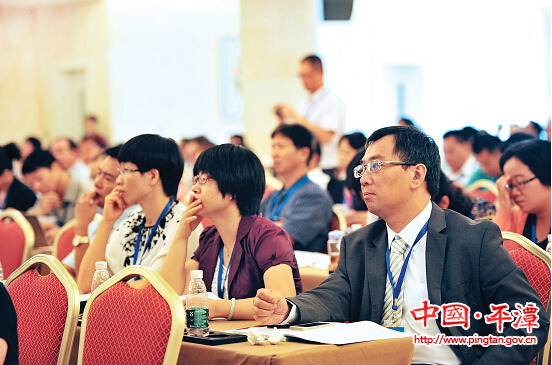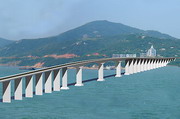Experts weigh in on legal construction in Pingtan
( chinadaily.com.cn )
Updated: 2014-08-27
|
|||||||||
More than 170 law experts, scholars, judicial officials and lawyers from across the Taiwan Straits took part in a law forum in Pingtan, Fujian province, and shared their opinions on the legal construction of Pingtan on Aug 18.
 |
|
Law experts and scholars from the Chinese mainland and Taiwan participate in a law forum in the Pingtan Comprehensive Pilot Zone on Aug 18. [Photo/pingtan.gov.cn] |
Ecological preservation was the main topic of the 12th Cross-Straits Law Forum.
Pingtan is aiming to build itself into a “Common Homeland” for people from across the Straits, so it can allow Taiwan people to engage in the administration of environment-related affairs, according to Xu Zhaoji, a law professor at the Party School in Fuzhou.
Meanwhile, Pingtan’s residents should increase their awareness of environmental protection. And policy-makers must enhance their capabilities in balancing environmental protection and economic development, always putting the former as a priority, he added.
Xu also suggested that Pingtan could draw experience from Taiwan in mechanism construction and social management.
“In addition to taking up precautionary measures against ecological contamination, Pingtan ought to establish an accountability system which details compensation standards enforced on polluters.”
Ma Po, deputy dean of the School of Humanity and Law of the Guangdong University of Petrochemical Technology, provided sparks in the legislation on environment protection in Pingtan.
“The legal system is an important guarantee for Pingtan’s development. Given its unique environmental resources and fragile ecological status-quo, Pingtan has every reason to set up a special law system on those issues which best suits itself,” he said.
Ma proposed that Pingtan, when getting down to legislation on environmental protection, should absorb experience from other regions in China, and at the same time explore cooperation with Taiwan, hearing opinions from Taiwan’s officials and experts while taking advantage of a series of preferential policies from the Central Government.
He also urged government to strengthen responsibility of environmental protection and called on the public to participate in the cause, to ultimately create a multi-layer mechanism overseeing the mission.
Pingtan is focusing on economic growth. But it should also make more ecological efforts and build itself into a beautiful tourism resort in order to attract more investment from Taiwan, noted Cai Shouqiu, president of the China Association for Environment and Resources Law (CAERL).
His sentiment was echoed by Jiunn-Rong Yeh, a law professor at the National Taiwan University.
“The whole world is appealing to Taiwan (for investment). I think a sound investment climate matters a lot. And the legal construction is an integral part of building that investment environment. A complete legal system can suppress a thirst for short-term profits and make people to look further (in terms of sustainable development),” said Yeh.
Pingtan has to take its environment bearing capacity into account, as the environment itself forms a restriction on the scale of economic development. Take Xiamen city as an example. It has limited development due to a small territory that can only hold limited population and industries, said Xu Xiangming, CAERL’s vice president.






